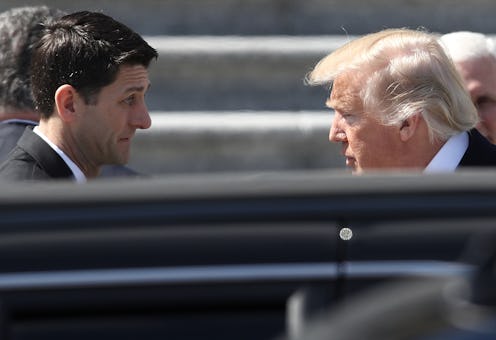News
Trump Might Include Democrats In On A New Healthcare Bill

When Trumpcare went down in flames due to lack of Republican support, the White House was expected to drop the issue and move on. But according to the Financial Times, the president still wants to pass some manner of healthcare reform — and if House Republicans can't agree on a bill, Trump might work with Democrats on healthcare. Though that may sound like a great idea, he may have a difficult time reconciling differences between the two opposing parties.
Trump told the newspaper that he's currently in negotiations with the Freedom Caucus, the bloc of far-right House Republicans who effectively scuttled Trumpcare before it could come up for a vote. If those negotiations fail, Trump said he's willing to cross the aisle in order to get some form — any form — of healthcare reform passed.
"If we don't get what we want, we will make a deal with the Democrats and we will have — in my opinion — not as good a form of healthcare, but we are going to have a very good form of healthcare and it will be a bipartisan form of healthcare," Trump said. "I promised the people great healthcare. We are going to have great healthcare in this country."
What such a plan would look like is unclear, however. The bill Republicans proposed in March would have rolled back major portions of Obamacare, including its premium tax credits for low-income Americans and Medicaid expansion. Those are Republican proposals, not Democratic ones. In fact, Trumpcare was full of policies that Democrats hate, which is probably why the bill wasn't supported by a single Democrat.
If Trumpcare genuinely represented Trump's vision of how American healthcare should work, it's impossible to see how he'll find any common ground with Democrats. If, on the other hand, the president doesn't actually care about the policy details, and simply wants to put a win on the board, there may be room for him and Democrats to work together.
In January, Trump promised that his healthcare reform bill would provide "insurance for everybody" — that is, universal coverage — and that "the government's gonna pay for it." That sounds an awful lot like the "Medicare-for-all" bill that Sen. Bernie Sanders plans to introduce in the Senate. Also known as single-payer, this plan has long been a pipe dream for politicians on the far left, and would allow all Americans to buy health insurance directly through the federal government.
Were Trump to get behind a policy like that, he'd likely attract the support of a good number of Democrats. Unfortunately, he'd probably also lose the support of just about every Republican, as single payer is nothing less than a monumental expansion of the federal government. And therein lies the problem with Trump's work-with-Democrats idea: Any policy that's palatable to congressional Democrats is anathema to Republicans, and vice-versa.
In theory, bipartisanship is a fine ideal to strive for. But in certain areas of policy, the two parties simply hold diametrically opposed ideas that can be difficult to reconcile. At this point in time, healthcare is such a policy. Trump deserves credit, I suppose, for being open to working with the other party. But even if he does, it might be difficult to accomplish anything.